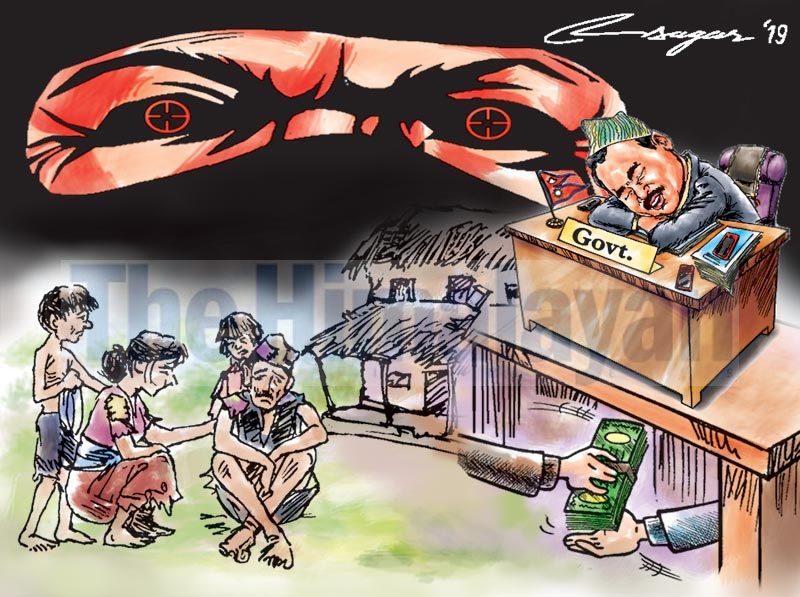Checking terrorism: Efficient intelligence required
Accepting that there is unlikely to be a final victory in the war on terror means acknowledging that the struggle cannot be pursued by military means alone. Counter-terrorism efforts will have to extend beyond intelligence gathering
On Sunday, April 21, suicide bombings hit three Catholic churches and three upscale hotels of Sri Lanka, killing more than two hundred and critically injuring a few hundred others.
Reports pouring in on the incident reveal that security authorities had been lenient, or inactive, despite warnings about the activities of Zaharan Hashim, a radical Muslim preacher accused of masterminding the Easter Sunday attacks.
This is a lesson on how alert, sensitive and efficient a national intelligence system should be.
Terrorism is a complex phenomenon. Terrorist groups target states that are undergoing reforms or change. They take advantage of bad governance, poverty, injustice, corruption, and lack of state resources and skills to fight terrorism. These are their ‘soft targets’. A corrupt government is surely bound to fall victim of terrorism.
Despite worldwide efforts, the threats of terrorism are increasing. Nepal cannot be an exception.
Therefore, as we greatly rely upon the physical security system, it will be sensible to do some introspection of the current security system.
The first step towards reforming the security system is to develop a comprehensive national security policy and plan -- a visionary blue print.
A national security framework sets out the government’s approach to security, defines the types of national interests, threats, appraises the hazards and risks, and plans how such an envisioned security is expected to be achieved.
The system should focus on meeting a wide range of present and future challenges, not just on those spawned by the current or immediate crisis.
Our responses to high profile terrorist acts are often traditional -- more reactive than proactive. So the State must take immediate action to formulate immediate and short-term laws, policy and action plan to invest in rigorous research, neutralise criminal plans, deactivate profit motives and assign special task forces to prevent terrorism of all nature.
Intelligence is costly; the absence of it is more so. In seeking to take action against transnational organised criminal activities occurring inside and outside the country, it is necessary to bring to bear the enormous information gathering capabilities of the Intelligence Community that has both collection systems and human agents available throughout the world. Harmonising the domestic laws and policies against transnational organised criminal activities is an important and urgently needed reforms.
Various multi-disciplinary approaches are recommended, and these resonate with calls for proactive integrated policing and wider engagement with law enforcement partners.
A proactive strategy, however, means shifting the attitudes of law enforcement towards holistic political, social and economic vulnerabilities that crime networks seek to exploit.
A broader view of today’s terrorist and criminal groups is needed, given that their methods and their motives are often shared. The ultimate test of this will be greater effectiveness in observing, detecting and apprehending politically and economically motivated criminals that undermine the security of the country.
Understanding network structures and operations make it easier to identify vulnerabilities against which concerted attacks should be directed. Of particular importance is the identification of critical nodes. Despite the muscular image of the police, much of modern policing revolves around the management of information.
We need an effective integrated security system with definite roles and responsibilities, an efficient governance system, intelligence and assessment, a national security policy, and an efficient, welltrained and equipped workforce. Police are now ‘knowledge’ rather than ‘craft’ workers, and this is increasingly so as the full impact of the ‘information age’ is realised. High-order research and analytical skills and communication skills are increasingly needed along with traditional skills and discipline.
It is essential to attack all kinds of organised crime groups through a professionally sound and closely coordinated nationwide effort.
There is a need for a special counterterrorism security force to deal with terrorism. We should reorganise, calibrate and tunein our security forces appropriately to face any upcoming challenges. This will require an overhauling of the administrative and managerial capacity of the concerned ministries and departments also.
Accepting that there is unlikely to be a final victory in the war on terror means acknowledging that the struggle cannot be pursued by military means alone.
Counter-terrorism efforts will have to extend beyond intelligence gathering.
The other important step would be to encourage the preparedness of other national security stakeholders, including the private sector and NGOs and faithbased groups and incorporate them into our national preparedness efforts.
Finally, without adequate focus on a social crime prevention strategy, the justice system remains overburdened today. By relying on the law enforcement mechanism alone, the present strategy is incurring huge costs associated with investigation, prosecution and imprisonment.
Therefore, adopting a preventive strategy as an option to reactive approach will be more effective.
Thapa is a former AIG of Nepal Police






